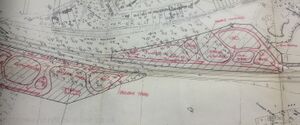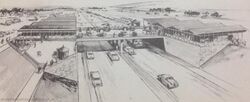Where to start

Although this website is all about ensuring our database is as up-to-date as possible, thanks to our great team of editors we are mostly on top of this task. Sure, if you've spotted something we've missed or you have photos to share then we'd really appreciate it, but where we really need help is with tasks which are sadly more administrative.
However big or small, your contributions are genuinely appreciated. Many of you want to make sure the most important work gets done first - and this is where it is.
Empty Lists
The following links each list pages that have a problem. If possible, those lists should be empty:
- Pages which have no photo - if none of the photos available are suitable then they can stay in this category. The dream would be to be able to source a new, suitable photo.
- Pages with errors - realistically there will always be a few false positives.
The following maintenance lists should be empty:
These lists need to be kept an eye on to make sure they're not out of date:
- List of pages which reference an ongoing event (check that the information on the page is still up-to-date)
- Pages with references to money (once the money becomes "old", the page should adopt Template:Inflation)
Re-reading
Some of the text on this website has been there for ten years. Other parts were written yesterday. We need to go back over everything we've written to check it's still correct, and that it all makes sense when read as one page. If you're bored, you can tap 'Website' and then 'Random Page' to jump right in.
While nobody is expected to learn the Style Guide off by heart, you may wish to learn one section of it and look for pages which breach it.
When checking over existing pages for errors, two common problems to look out for are parking prices being out-of-date, and out-of-date trivia, especially when something has been described as "coming soon" for a long time.
The bloating problem
The final issue we need to be aware of is that the site can become too bloated. This can manifest itself in too ways.
The first is when one page is being dominated by one particular sub-issue that really ought to be moved on to its own page. For example, a nearby unsigned service area which happens to be very interesting, or a related brand which we could explore in detail. Long pages can be annoying and confusing for readers, and we're doing ourselves a disservice if we have an opportunity to create a new, better page.
The second form of bloatedness is when we have pages which have been created despite us having nothing to say. If all we can write about something is one sentence, it's better to have that on one page than to create a special page which has nothing to say.
Links
Motorway Services Online contains a number of redirects to subtly fix common mistakes, aid navigation, and keep the code tidy. While they are useful, redirects should still be avoided where possible, as they basically double the number of pages being loaded which slows things down for everyone.
Unless they are being particularly useful (generally by preventing the code from looking too unwelcoming), internal redirects should be removed from the website code. This includes http -> https.
Links from us to other websites should avoid redirects too, unless there is a chance the destination page could change. (For example when linking to a website homepage and it starts adding tracking data to the URL - we don't want that.) In addition, links to other websites need to be checked for any that have broken - government departments are particularly bad at moving pages around.
In general we can't control links from other websites to us, and we are grateful to have any at all. However, if you have an opportunity to update a link to us which uses a redirect, please do. SABRE and Wikipedia are both filled with links to us that are 15 years old!
Original research

When this website first started, we all had huge gaps in our knowledge and would be willing to accept any old wives' tale about service stations. Having consulted a lot of historic documents and spoken to a lot of experts we've now weeded out a lot of the fiction, but we still have people coming up to us telling us that we're wrong and that their theory that has no evidence is correct.
We don't need that! What we do need is people who are able to find concrete evidence to fill the gaps in our knowledge. It takes time, but all accurate projects do.
On that note, while we appreciate people have good intentions when they use information from other websites, they are not reliable enough - even the official company ones! What we need is volunteers with the time to visit services and physically verify our information.
Local Records
Councils across the UK have archives, many of which will have records relating to the planning of motorway services in their region. We just need volunteers with the time to sift through it all.
Some of the places which we believe have new information to uncover are:
- Conwy Archive Collections
- Hampshire Record Office
- Leicestershire Record Office
- Lincolnshire County Council
- National Library of Scotland
- Northamptonshire Archives
- University of Glasgow
- University of Lincoln
There will be more that we haven't even checked with yet.
Similarly, local councils are continually uploading documents related to old planning applications to their websites. These can be useful to help describe the old layouts of service stations, and the text can sometimes tell us a bit more about unfulfilled plans. We have most of these crossed off, but more are regularly being added. The same tool is a good way to identify new developments, too.
National Archives
The National Archives in Kew is the government-level equivalent of the local council archive. We have only covered about half of the documents they have related to service stations, but we think we have crossed off most of the major discoveries. There are probably still a few surprises to unearth though, and again it just needs someone with the time.
If you are interested in this (whether it's to help us or just for your own pleasure), the place to start is:
- MT 121 (for the Highway Series; from the 1960s), which has about 230 folders of interest.
- MT 158 (for the MSAB; for 1969-1992), which has about 110 folders of interest. They are huge and usually arrive in sets of three.
- There's at least 50 more folders of interest spread out over other areas. For example motorway service areas are sometimes mentioned by the Prime Minister's Office (PREM), and they are also under the remit of LM 2, although we can't find anything.
Using the National Archives for the first time can be daunting, but many people find it soon becomes addictive. We can provide advice for those who'd like some. Each folder will mostly contain old letters dealing with government policy, plans and concerns, most of which will be unexciting, but at any point a gem of information can appear. Those gems can be anything from old photos, descriptions of the facilities, failed ideas, or the answer to something we'd always been wondering about.
Irish service stations are all protected under their government's 30 year rule, so it's not worth trying.
Commercial Services
Some research services are only available to paid subscribers, but students may be able to get free access through their institution.
Thanks to our members, we have already extensively researched:
- The British Newspaper Archive (free in libraries) and Newspapers.com
- Lexis Nexis
- Edina Digimap
- The Internet Archive (free)
- BBC Genome (Radio Times) (free)
- Commercial Motor Archive
If you believe you can find more from them, don't let us stop you trying, but this won't be the best use of your time. But there may be another service you have access to, especially relating to old publications, which may be new to us.
Do be careful when dealing with old newspapers (and even old maps), because not everything they print is accurate.
Third-Party Photos
In an ideal world all the photos hosted on this website would be completely unique. Realistically, that's not possible, but fortunately the Geograph project has wide library of suitable images, that can help with the areas where we are lacking.
We don't want to be copying their images just for the sake of it. However, where their image shows something we don't have, it should be uploaded here, so long as all the fields are filled out correctly. It's very important that the photographer and source are correctly attributed.
It is not acceptable to simply take a photo from another source without the appropriate licence. That includes photos shared by others on social media. Some old leaflets, postcards and screenshots from very old TV shows may be acceptable to share under "fair use", so long as you are using a single image to illustrate a point. If in doubt, don't share it.